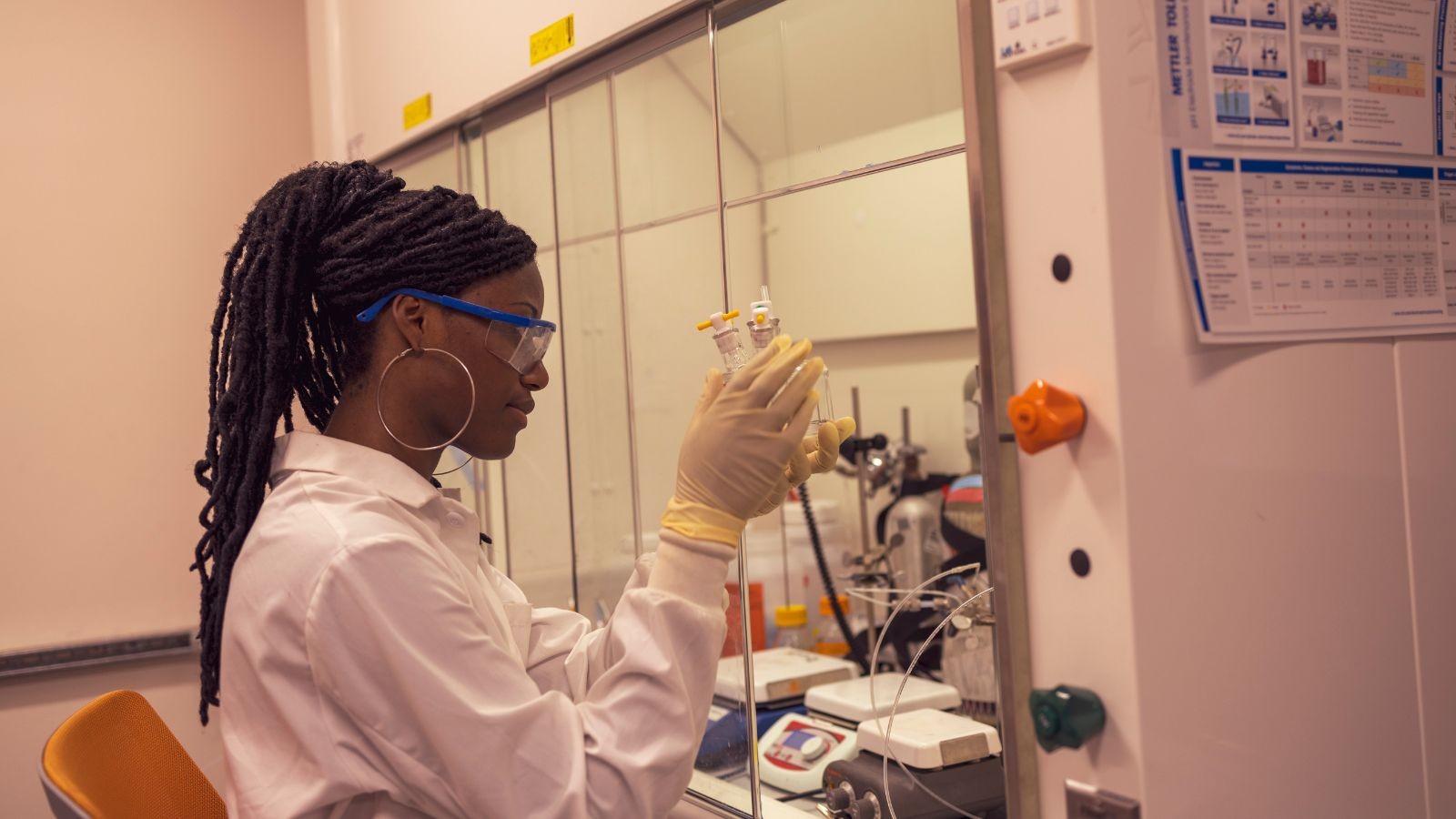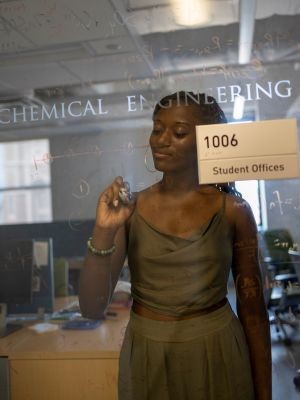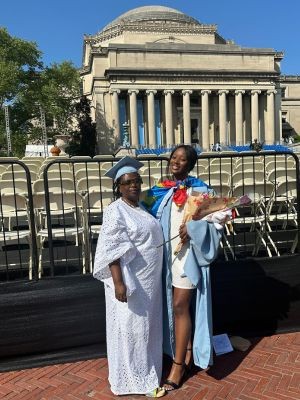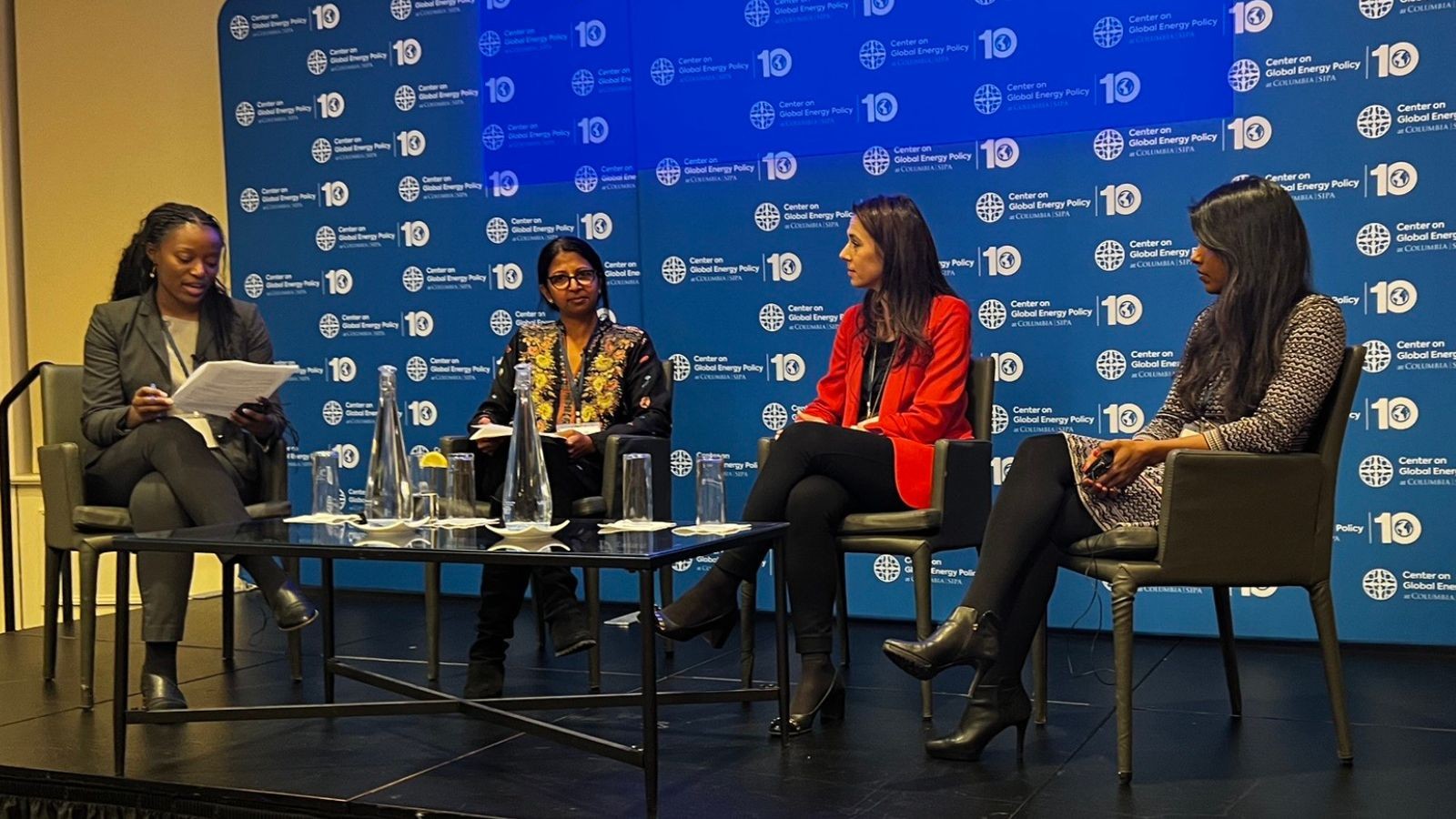Daniela Asifiwe Bushiri on Perseverance, Renewable Energy, and Dreaming Big as Refugee
Daniela is a third year PhD candidate in chemical engineering at the School of Engineering and Applied Sciences. She was born in Congo, grew up in South Africa, and moved to the United States with her family as refugees in 2016. Daniela is passionate about making energy equity a reality through her research and hopes to inspire others with her story.

"Women's History Month is a time to be grateful that women in the past, especially women of color, have stood up and fought for the freedoms we all enjoy."
This interview has been edited for clarity and style.
Why were you interested in participating in our Women’s History Month campaign? What does Women's History Month mean to you in general?
The reason I responded is there are not a lot of black women in STEM, and I wanted to share my story. For others who wish to pursue graduate studies and who identify as black women, I want them to see it's possible.
To me, Women’s History Month showcases the track record of how resilient and strong women have been and how they have fought for the freedoms that I currently enjoy. I'm always excited to learn more about trailblazing women from the past and present who are creating a way for a woman like me and younger to walk through. I cannot imagine a life where I cannot vote, or I cannot attend school.
Women's History Month is a time to be grateful that women in the past, especially women of color, have stood up and fought for the freedoms we all enjoy.

How did you get interested in what you're studying?
When I was in high school, I was very interested in math and sciences. I'm a first-gen college student. When my family moved to the United States, I was looking into colleges. I found that chemical engineering was a program that interested me because it incorporated math, physics, and chemistry, which I really enjoyed, and the career opportunities seemed very versatile. I knew I could go into any field with it.
Throughout my undergraduate studies, I became interested in research. I did research as an undergrad at the New Jersey Institute of Technology. From there, I realized I enjoyed research and deep learning. I wanted to pursue graduate studies to see if becoming a professor was something I wanted.
Growing up in South Africa, we had many power outages. Our grid wasn't that stable. I was inquisitive about why we didn't have constant electricity. Our grid relied on burning coal to create electricity. Not having power and studying by candlelight motivated me to study energy. I wanted to produce technology that would help make energy equity a reality.
I wondered why we didn’t use the abundant sun, and I was curious about how we could scale up renewable energy technology. When I was looking into grad schools, I found that Columbia had a really good program when it comes to energy research. I also loved that Columbia's mantra is “engineering for humanity” because I’m motivated by impact.
"Not having power and studying by candlelight motivated me to study energy. I wanted to produce technology that would help make energy equity a reality."
Can you tell me more about the work you’re involved in at Columbia?
I’m involved in a club called CORE^2, which is the Coalition on Race and Ethnicity in Engineering. It exists to create a platform and environment for historically underrepresented minorities in STEM.
I was vice president, outreach chair, and now I'm a member. I'm really passionate about that club because we try to create a space for historically underrepresented minority grad students to feel welcome and to help them feel that they belong here. We also do outreach in the community at Columbia Secondary School.
When I came to Columbia, I was the only Black PhD student in my department, and that was shocking for me. I needed to find communities to be able to relate to people. When you're the only one in a group, you always have this Imposter Syndrome. People will say microaggressions or undermine you. Being part of the CORE^2 community really helped affirm why I'm here and helped me build a community to find support from and support other people.
Other than that, I'm active in the Women in Energy Initiative at the Center on Global Energy and Policy. Last semester, I did my first panel centered around careers in the energy transition. From there, I've been moderating some fantastic panels. Yesterday, I moderated a panel celebrating Black voices in the energy transition.

Who is a woman who has inspired you?
My mom. There are a few people, but she is the first to come to mind. I was born in Bukavu, Congo, during a time of war, and we had to leave as refugees.
I grew up in South Africa, and then the United Nations moved my family to the United States in 2016. Through all that, my mom showed significant resilience, strength, and perseverance. Being a victim of war but still having the courage to flee and live as a refugee – she did all of that while also caring for my family.
The perseverance, resilience, and strength she showed throughout the journey and the sacrifice she took for me to have the life I have today inspire me the most. It tells me to keep going and to keep trying. It changes my mindset in terms of how I navigate life. I always see life as an opportunity, try my best, and keep my head high. There's always hope for tomorrow.
What is the focus of your research, and what motivates you to pursue it?
I'm motivated by the impact my work will have. I believe that if you don't have energy and electricity, your quality of life is impacted, and it can be challenging to access education and healthcare.
In my research, I develop electrocatalysts for efficient production of renewable fuels, such as hydrogen and ammonia. These fuels can be used for energy storage to overcome the intermittency of some renewable energy sources like solar and wind. They can then be used to produce renewable electricity or as a raw material to decarbonize many sectors. I'm motivated by impact and think, let me get up, go to the lab, and run those experiments because these ideas will help bring energy equity to the people that need it the most.
I’m also motivated by wanting to make my family proud. We went through a lot as refugees and victims of war. I want to ensure that all my parents’ sacrifices are not wasted.

Do you see yourself as an inspiration or a role model to others? Can you talk about the reception you get visiting schools?
I hope to inspire others to dream big and strive not to allow their circumstances or their background to define them. When we do outreach at schools with CORE^2 and talk to students about our work, many times, the kids are very excited and curious.
We’re providing a space for them to explore questions they've always had. I remember one time I went with my friends to Zanzibar, Tanzania, and we visited an orphanage. When we visited the orphanage, we did science demos and taught the kids games. A friend of mine, who's a physicist and doing his PhD in applied physics, explained the basics of physics, and you could see the kids lighting up.
The reception's always bright, and we get comments back from students saying that they're interested in science now and they never thought it was possible for them, but now they know it's possible.
Why is it important that women are represented in your field of study now and in the future?
Women are very, very intelligent. Women are also very creative and can come up with really amazing solutions for our critical global problems. STEM spaces will only benefit if we have more women in the field who are contributing with their intelligence, dedication, and creativity.
"STEM spaces will only benefit if we have more women in the field who are contributing with their intelligence, dedication, and creativity."
Anything you want to add?
I talked a little bit about my refugee story. That's another community that I also want to encourage.
I am a former refugee from the Democratic Republic of Congo. There’s an ongoing war that is still happening today because our natural resources have been exploited for many years. Many of these resources, such as cobalt, copper, and coltan, are critical minerals needed for the advancement of technology and the energy transition. Control over these resources has been a significant driver of conflict among various groups, including rebel factions and foreign interests. I encourage everyone to read more about the conflict in Congo.
As a former refugee, being a student at Columbia may have seemed impossible for me growing up because I grew up poor. I grew up as a refugee in South Africa, struggling. I want to highlight that perseverance, faith in God, being able to dream big, and having a lot of people who believed in me – my family, my parents, my siblings – is what led me here.
To anyone who identifies as a refugee or asylum seeker, I encourage you to keep dreaming big and keep persevering. Believe in your abilities, and never let anyone discourage you from your dreams. I had many people in my trajectory who told me, “I don't think you'll ever get there,” or “Maybe you should try something else.”
Seek mentorship. There are a lot of people whom I've reached out to who are in positions I wish to be in, and developing relationships with them helped me become more confident in myself. It also gave me the tools I needed.
Many people don't have anyone in their family who is an engineer or a doctor or pursuing a doctorate. I had no idea what these entailed, but I was bold enough to reach out to people on LinkedIn and say, “Hey, I'm interested in this. Can you give me more information?” So, be bold and never give up.
"To anyone who identifies as a refugee or asylum seeker, I encourage you to keep dreaming big and keep persevering. Believe in your abilities, and never let anyone discourage you from your dreams."
Want to share your story with us? Fill out this form or write to us at [email protected], if you'd like to connect with us about Student Voices.
